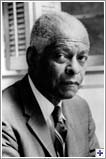succeeded against the odds

Dr. Benjamin Elijah Mays
In l940, on the eve of the new era, Benjamin E. Mays became president of Morehouse College.
He was 46. “If Morehouse is not good enough for anybody,” he said at the beginning, “it’s not good enough for Negroes.”
Born in a shack in Ninety-six, South Carolina, in 1894, Mays succeeded against the odds. It was this spirit that endeared him to the generations of students.
Although he taught no classes, his spirit permeated the campus, and students made a point of catching his now famous Tuesday morning chapel talks. Week after week, Tuesday after Tuesday, for 27 years, he preached engagement, responsibility, and stewardship. Education, he said was an obligation, not a privilege. One was obliged, he said, to put one’s knowledge at the disposal of the people.
Strong himself, Mays demanded strength from his students. He had developed early in life, he said, “a hard, maybe cruel, certainly an exacting and unrelenting philosophy,” which he applied to himself, to his students, and to all mankind. “No person,” he said,“deserves to be congratulated unless he had done the best he can with the mental equipment he has under the existing circumstances.” And he added: “Do whatever you do so well that no man living and no man yet unborn could do better.”
A witness for freedom, and a mode of freedom, Mays created a climate of freedom which bore fruit. It is no accident that a disproportionately large number of his students went on to make their mark as college presidents, lawyers, doctors ,teachers, Ph.D.’s and hell raisers.
It is no accident that disproportionately large number of his students and disciples played prominent roles in the Freedom Movement. He was honored repeatedly in these years. Presidents Kennedy and Johnson appointed him to various commissions and delegations. In l963, he was appointed by President Kennedy to the official U.S. delegation to the funeral of Pope John.
After retiring from Morehouse, Dr. Mays was elected to the Atlanta Board of Education, where he served as president for 12 years. A white member of the board said of him in l977 that “he is the most widely respected citizen in Atlanta today. If you took a poll, he would come out on top. He is the kind of man we would like our kids to grow up to be. ”This was the life—hard, demanding, magnificent—that Benjamin E Mays lived until his death on March 29, 1984.
Near the end of his life, he looked back through the haze of the years and said, “There is no doubt that we have made some progress in race relations, but you still have to keep your eye on the struggle against racism in the world and the fact that what the Negro has gained he has gained through struggle, and through marching and boycotting.”
His advice for the young was “the challenge I accepted for myself, to keep tiptoeing and never accept mediocrity as a goal.”
Dr. Benjamin E. Mays was an inspiration and advisor to his students, including Julian Bond, Andrew Young, and Dr. Martin Luther King, Jr., who referred to Dr. Mays as his "spiritual mentor."
(((your inner voice.com)))




